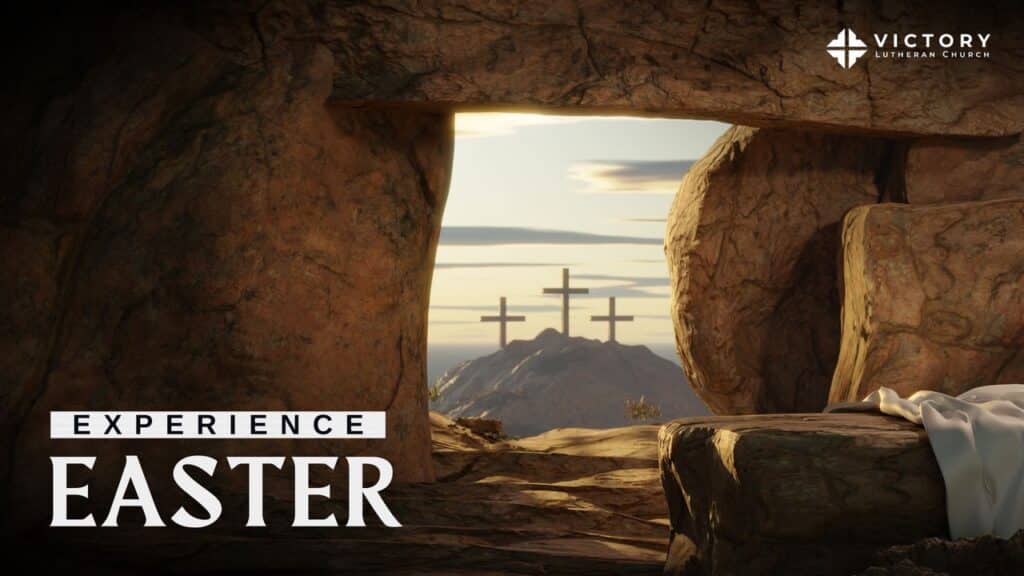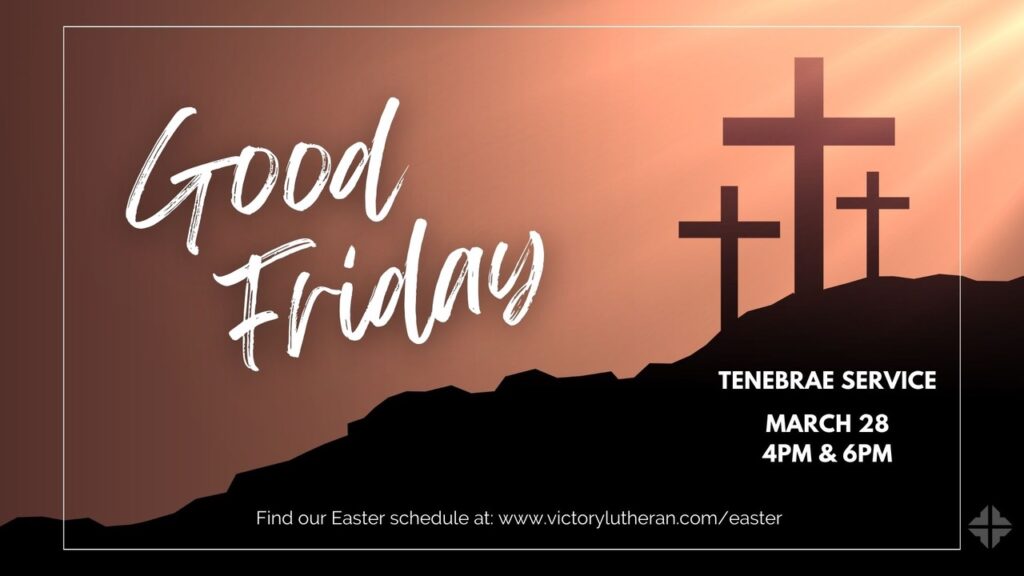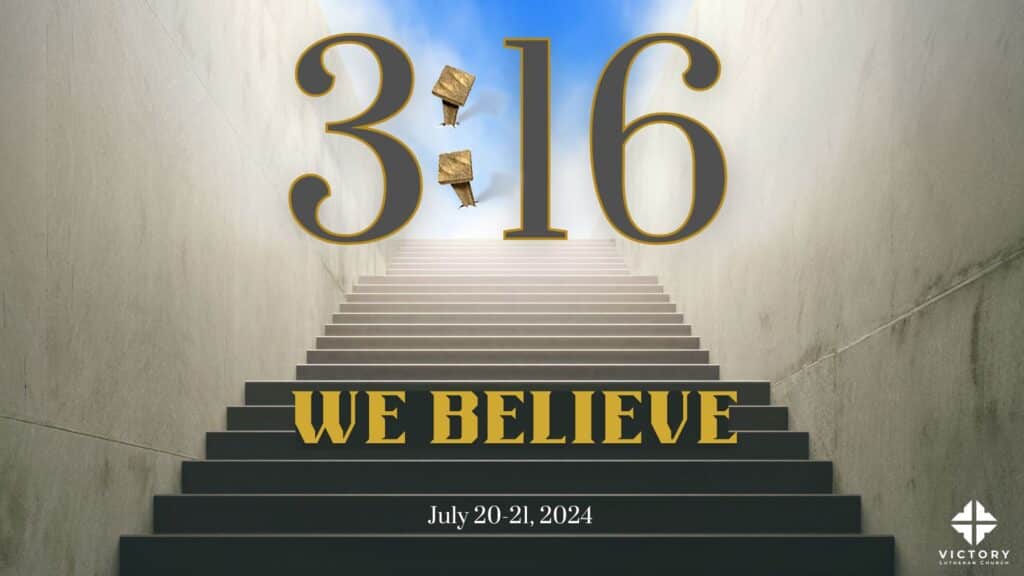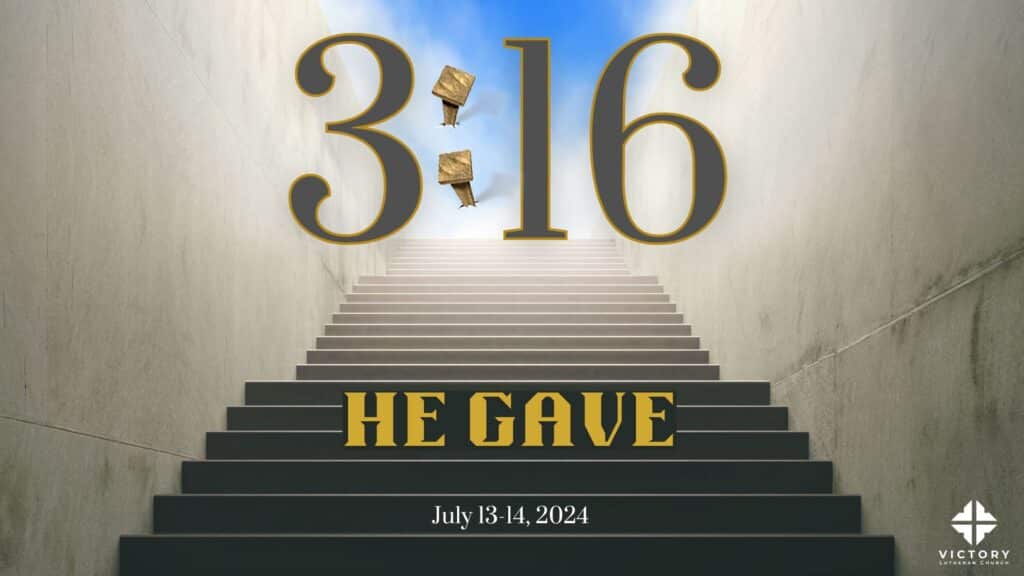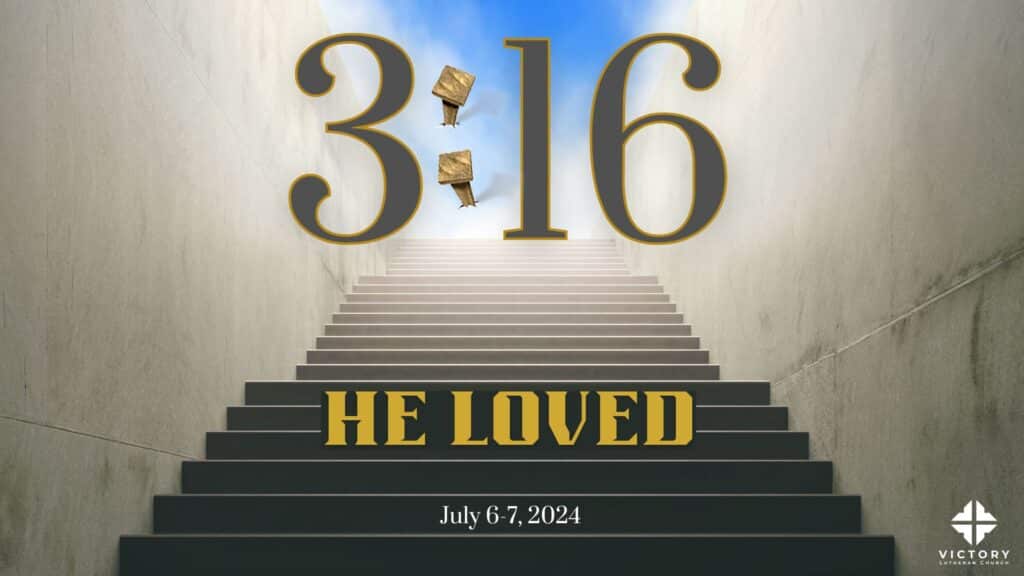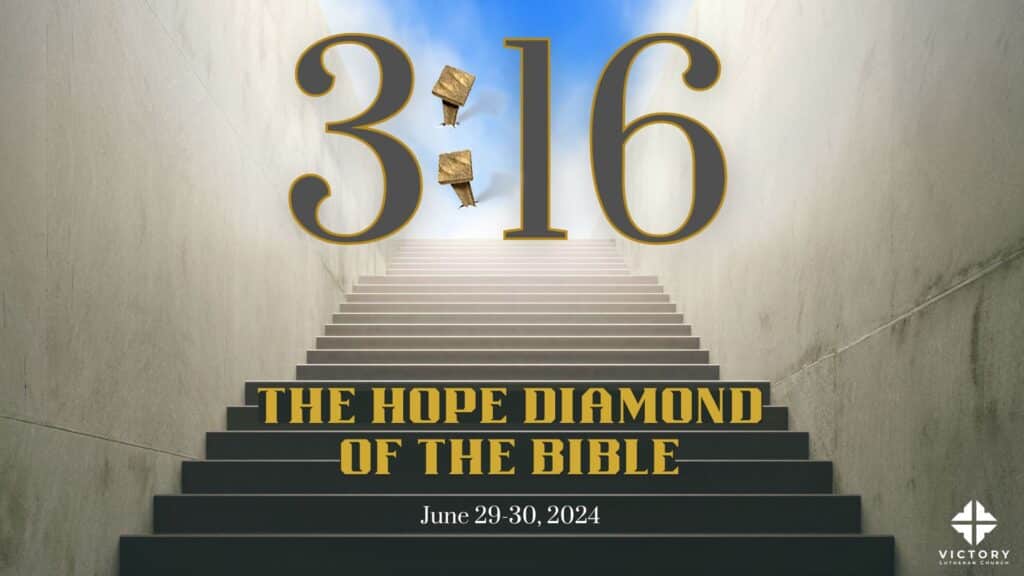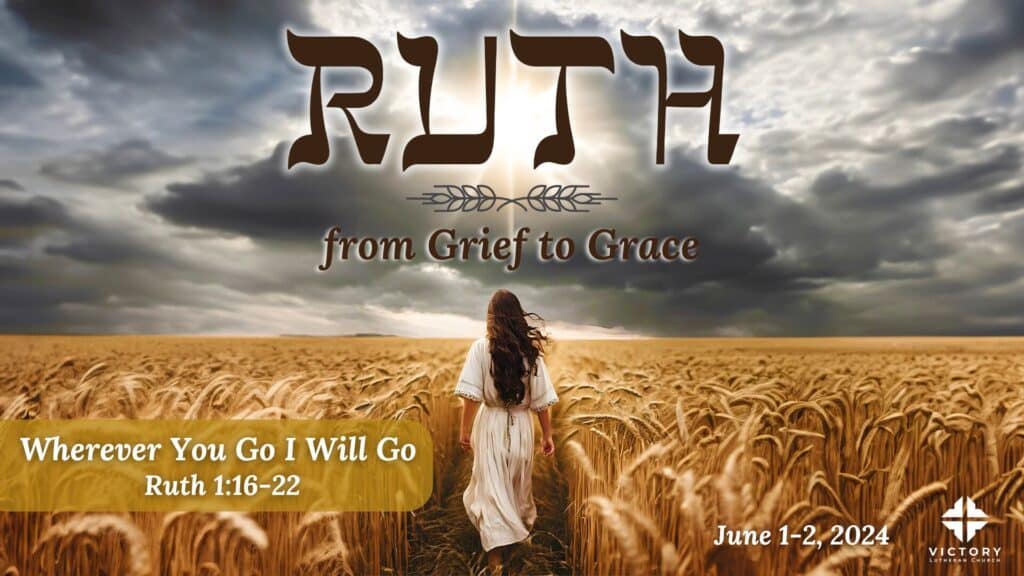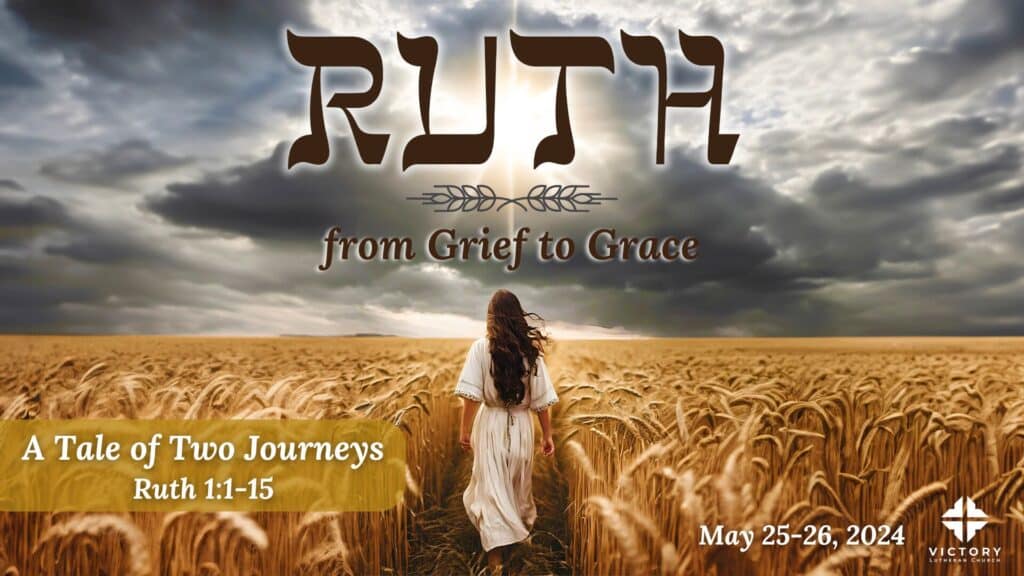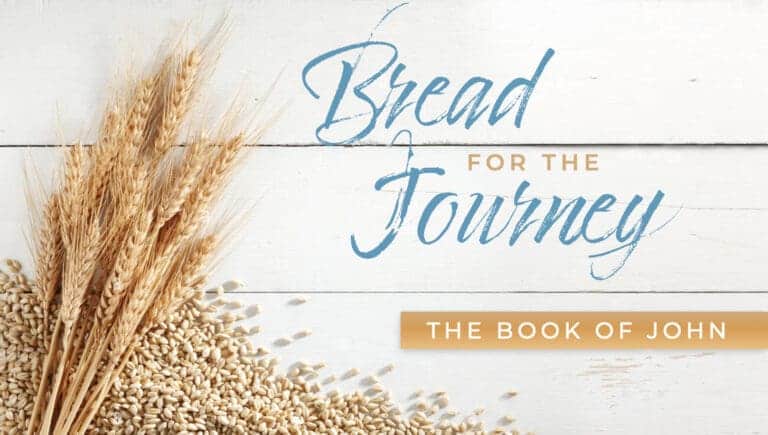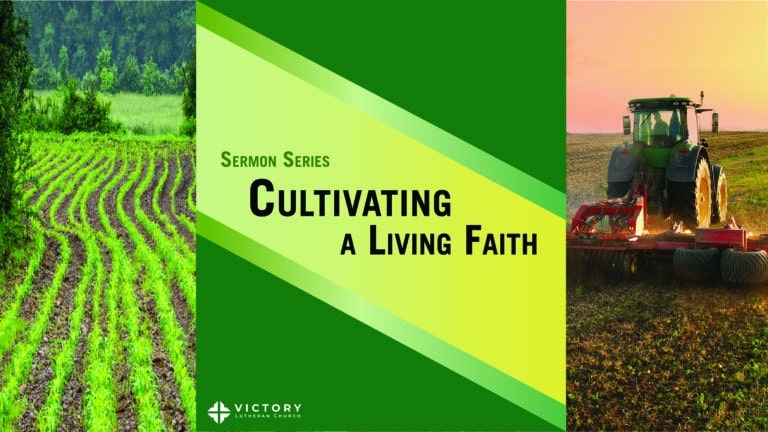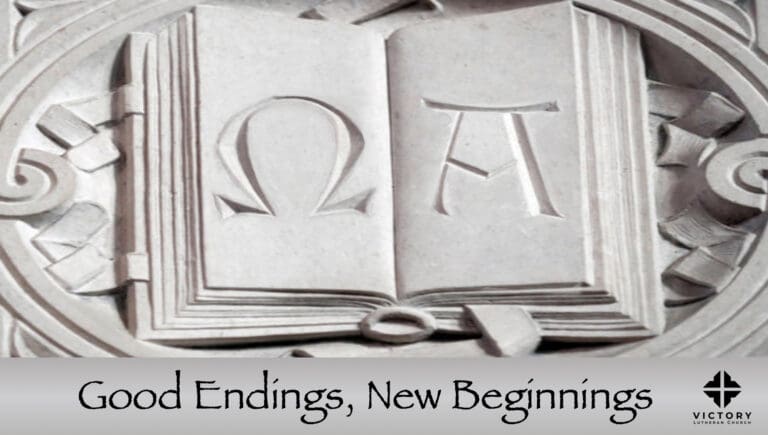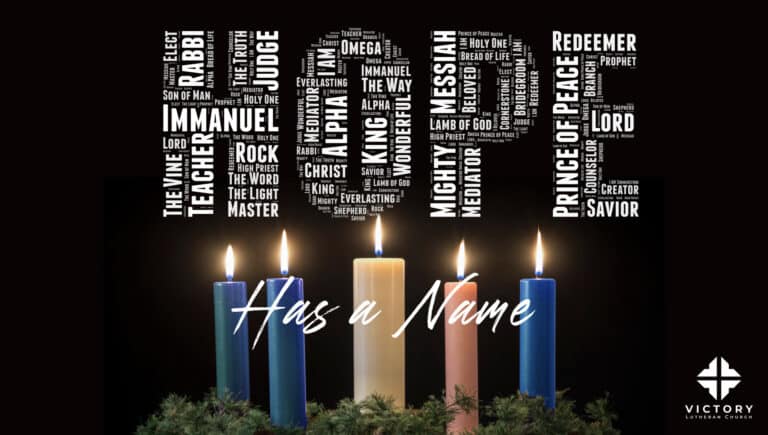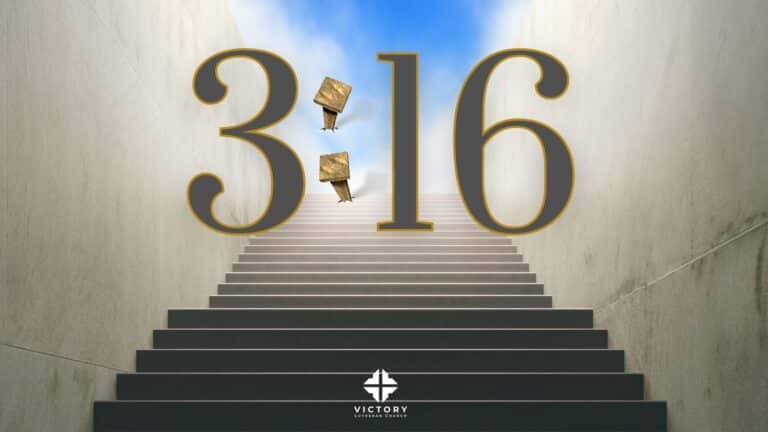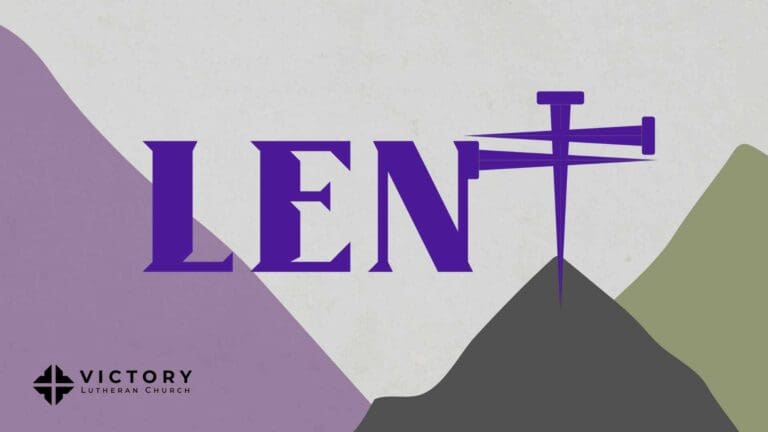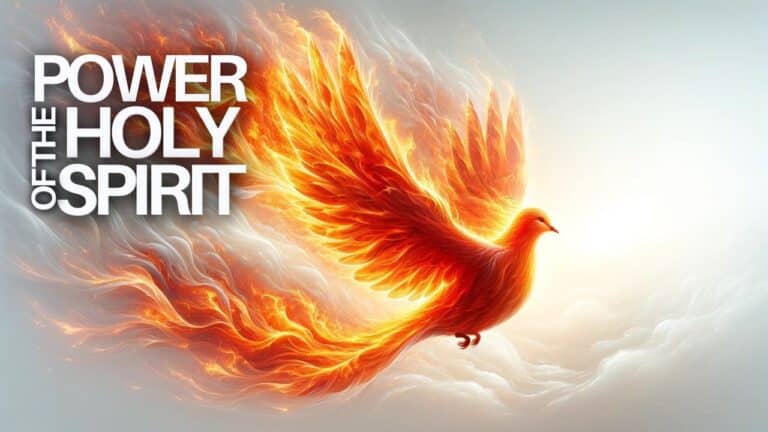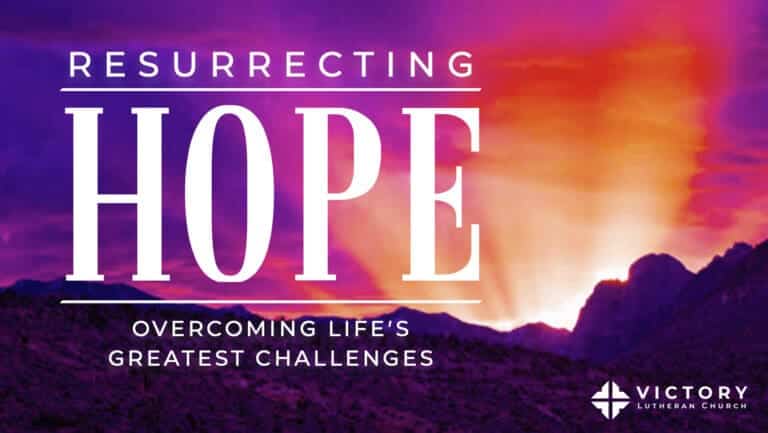It was the first Good Friday. Jesus knew that his life was soon in mortal danger. Has your life ever been in mortal danger, knowingly, before? Have you ever had the experience where you felt like your life was in mortal danger? I can remember one for me clearly. I was just eight years old. I grew up on a grain farm in South Dakota, and I, one afternoon, got to go out in the tractor to ride with my uncle, who was discing the field. And we had sliding doors in the tractor, and I can still remember, I’m on the right hand side, just kind of watching Uncle Sophus, you know, drive the tractor, and I’m sliding along the door. Not realizing I was inching closer and closer to the opening and before I realized it all of a sudden. I was free falling Backwards outside of the tractor cab now.
I landed softly on the dirt But as I could turn to my right I saw those that heavy disc Coming my way and that sent the fear of God into me And then my eyes noticed the big tractor tire Just kind of coming closer and closer to my legs and I remember crying out in terror and Thankfully my uncle heard me hit the clutch and the tractor Stopped right with the tire coming right up against my leg, but not over them I can still recall that incident of course vividly as I just described it Well our Lord Jesus Christ on that night In which he was betrayed. He knew full well the suffering and the trauma that awaited him in just those next hours. He knew that not only was his life in mortal danger, but that he would actually die that very next day. Enduring an ordeal. And so in the Garden of Gethsemane, that night in which he was betrayed, Jesus cries out to his father in heaven in a gripping prayer, uh, that he was praying in what must have been his garden of safety. and of renewal and of communion with his father, the garden of Gethsemane. So we’re going to read an account of coming up into that garden, what led to it, and then being in the garden itself.
We’re going to be in Mark 14, beginning at verse 22. And we start in the upper room. Words that will be familiar to you. While they were eating, Jesus took bread, and when he had given thanks, he broke it and gave it to his disciples, saying, Take it, this is my body. Then he took a cup, and when he had given thanks, he gave it to them, and they all drank from it. This is my blood of the new covenant, which is poured out for many, he said to them. Truly I tell you, I will not drink again from the fruit of the vine until that day when I drink it anew in the kingdom of God. When they had sung a hymn, they went out to the Mount of Olives. Amen. You will all fall away, Jesus told them, for it is written, I will strike the shepherd and the sheep will be scattered. But after I have risen, I will go ahead of you into Galilee. Peter declared, Even if all fall away, I will not. Truly I tell you, Jesus answered, Today, yes, tonight, before the rooster crows twice, you yourself will disown me three times. But Peter insisted emphatically, even if I have to die with you, I will never disown you. And all the others said the same. They went to a place called Gethsemane. And Jesus said to his disciples, sit here while I pray. He took Peter, James, and John along with him, and he began to be deeply distressed and troubled. My soul is overwhelmed with sorrow to the point of death, he said to them, stay here and keep watch.
Going a little farther, he fell to the ground and prayed that if possible, the hour might pass from him. Abba, father, he said, everything is possible for you. Take this cup from me, yet not what I will, but what you will. Then he returned to his disciples and found them sleeping. Simon, he said to Peter, are you asleep? Couldn’t you keep watch for one hour? Watch and pray so that you will not fall into temptation. The spirit is willing, but the flesh is weak. Once more he went away and prayed the same thing. When he came back, he again found them sleeping because their eyes were heavy. They did not know what to say to him. Returning the third time, he said to them, are you still sleeping and resting? Resting. Enough. The hour has come. Look, the Son of Man is delivered into the hands of sinners. Rise. Let us go. Here comes my betrayer. The Gospel of our Lord. We praise you, Lord. Let’s pray. Father in Heaven, we now listen for your word to us. And in our hearts, we listen to the words of your Son praying to you. So by your spirit, speak to us what we need to hear from you tonight. I ask in Jesus precious name, Amen.
Dear friends in Christ, grace to you and peace from God, our father and our Lord and savior, Jesus Christ, Amen. Today, I want us to consider three truths revealed in that prayer of Jesus in the garden. of Gethsemane. And the first is this, that Jesus wrestled in prayer. Jesus wrestled in prayer himself. Jesus prayer shows the depth of his agony over what he knew he was about to endure in order, in order to purchase our salvation with his own life, suffering, and death. Perhaps we witness the most poignant moment or insight into the life and heart of our Lord Jesus Christ. In this passage, we see Jesus wrestling in prayer in that garden, just minutes before his betrayal and arrest. He says, My soul is overwhelmed with sorrow to the point of death. He said to them, stay here and keep watch. Can you picture that scene in your mind’s eye? Jesus, fully aware of the weight of the world’s sin upon his shoulders, retreats to pray where he says his soul is overwhelmed with sorrow to the point of death.
Have you been there in your own prayer life? Jesus confides this to his disciples, urging them to keep watch with him. But what is the nature of the sorrow that was overwhelming Jesus? I think it was not merely the anticipation of the physical pain that he was about to endure, though that would indeed be excruciating and overwhelming. No. I believe the depth of Jesus agony lies in the realization that He, the sinless, spotless Lamb of God, would become sin itself. In 1 Corinthians 5, we read, God made him who had no sin to be sin for us so that in Him we might become the righteousness of God. I encourage you to dwell on that verse yet this day and tomorrow. Let those words sink deep into your spirit. Jesus who knew no sin, willingly took on himself the weight of our transgressions, becoming what some translations have as he became a sin offering for all of humanity. In that moment of prayer, Jesus wasn’t just grappling with the fear of physical pain. He was wrestling with that profound truth of his mission, to become sin for us, to bear the weight of our iniquities so that we might be made righteous in the eyes of a holy God.
Consider the significance of Jesus sweating drops of blood, a rare physiological phenomenon known as hematidrosis. It occurs under extreme stress or anguish, but this wasn’t just a symbolic gesture. It was a tangible manifestation of the depths of his agony. Consider the enormity of what Jesus endured even in that garden. Marvel at his selflessness, his willingness to suffer for On our behalf, and let us never forget, but always remember as we are about to do at communion to remember his love beyond our comprehension that Jesus willingly laid down his life to purchase our salvation. Indeed, Jesus knew firsthand what it was like to wrestle in prayer. Secondly, Jesus was honest, yet submitted to the Father’s will. He says, Abba, a term of endearment, Abba, Father, everything’s possible for you. Take this cup from me, yet not what I will, but what you will. You know, in this prayer, we see the full humanity and divinity of Jesus. Jesus was tempted. Father, if there’s any other way, let’s do it. Yet was without sin, yet not my will, but yours be done. We see the Son of Man, nature of Jesus, fully human, who experienced human temptation, that temptation of self preservation. And we also see the Son of God, nature of Jesus, fully divine, in that He submitted His will fully. To that of his father in heaven. One might imagine a vast desert wilderness stretching endlessly under a scorching sun. In this desert, there lies a traveler, weary, parched, struggling against that merciless heat. His lips cracked, his throat burning. He longs for relief, for a way out of that wilderness. Stumbles upon a flask. It can, its contents provide refreshment, salvation from the torment of the desert. But as he reaches out to grasp it, a voice echoes through that barren landscape, abandon the flask my child, trust in me and I will guide you through this desert. That traveler is not unlike Jesus in that garden of Gethsemane, wrestling with his calling, his purpose, his destiny, God’s plan. In this text in Mark 14, we witness Jesus in the throes of agony, his soul heavy with the weight of what was to come.
Abba, Father, everything’s possible for you. Take this cup from me. And herein lies the crux of the human condition, that temptation of self preservation. Jesus, fully human, feels the pull of his own desires, the instinct to avoid suffering, We know that full well. Jesus knows the pain that awaits him, the betrayal, the agony of the cross, and in his humanity, he longs to escape it. And yet, in that same breath, he surrenders himself to the will of the Father. Yet, not what I will, but what you will. Good words, but tough to incorporate into your own prayer life, no? In this moment, Jesus embodies the ultimate way of being honest, but also fully submitted. He doesn’t suppress his emotions or hide his fears, instead he lays them out to his Father in Heaven, offering up fervent prayer with cries and tears. He acknowledges the temptation to seek his own comfort, yet he chooses obedience even to death, death on a cross. But Jesus journey doesn’t end in the garden. In Hebrews 5, we learn that he was heard because of his reverent submission. In Hebrews 5, the Bible says, during the days of Jesus life on earth, he offered up prayers and petitions with fervent cries and tears to the one who could save him from death. And he was heard because of his reverent submission. Submission. Son, though he was, he learned obedience from what he suffered, and once made perfect or made complete, he became the source of eternal salvation for all who obey him. Submission. Through his suffering, he learned obedience, and in his obedience, he became the source of eternal salvation for all who would look to him in faith. Amen. Like that traveler in the desert, we often find ourselves, I think, faced with choices. Choices between our own desires and expectations and God’s will. Between self preservation and surrender. But just as Jesus trusted the Father in the desert of Gethsemane, so too, we can learn to trust Him in the deserts of our own lives. And so, by the work of the Holy Spirit, may we, like Jesus, find that courage to be honest about our struggles and yet steadfast and resolute in our submission to the will of the Father. And in doing so, may we discover the true source of eternal salvation from the one who guides us through the wildernesses of our lives and onto everlasting life. And finally, third. We learn that human willpower is weak, but the Holy Spirit is willing. In the Garden of Gethsemane, Jesus uttered these timeless words, the Spirit is willing, but the flesh is weak. And I’m choosing to take a second way to look at that, because this statement serves as both a recognition of human frailty. But I think also of the assurance of the Spirit, capital S, strength. Jesus is saying the Spirit is willing but the flesh is weak. It certainly could be seen as an indictment on his disciples, and in truth it was. Yet it also serves as an indictment upon ourselves. While in our own hearts and motivations we seek to be obedient to the Lord, if we’re honest.
Our actions do not always match our intentions, do they? However, for us in Christ, who are given the Holy Spirit, even though we cannot deny that our own flesh is weak, and that we still struggle with temptation and sin, just read Romans 7, the Holy Spirit is more than willing and able to keep us in true faith unto everlasting life. In other words, we don’t need to shrink back from our own weaknesses. Just admit them and confess them. The Apostle Paul writes in 2 Corinthians, But the Lord said to me, My grace is sufficient for you, for my power is made perfect in weakness. Paul says, Therefore I will boast all the more gladly about my weaknesses, so that Christ’s power may rest on me. I know we live here in the desert, but like my wife and I, we’re kind of ocean people also. Have you ever sat on the edge of a vast ocean, especially one that’s kind of surging, has waves crashing on the, on the shore, just has this relentless power to it. You can look at, at the horizon and feel. And I think this ocean might represent what we tend to feel about our own source of human willpower. That it’s vast, it’s powerful, at least that’s what we tell ourselves. But the truth is, ultimately, even our own willpower, just like the ocean, is finite and subject to the whims of the winds and tides. Contrast that with A lighthouse on the edge of an ocean. It’s beam piercing through the darkness, unwavering, constant. This lighthouse is like the Holy Spirit, steadfast, unyielding, and always there to guide us through life’s storms. Jesus speaking these words to his disciples, the spirit is willing, but the flesh is weak. It’s not just a simple observation. It’s a profound truth that resonates even down through the ages. The disciples, like us, filled with good intentions, with a willingness to follow Jesus wherever he led. But when faced with the trials and temptations of the world, their human willpower faltered and they ended up betraying, denying, and even doubting. For their flesh indeed was weak. And don’t kid ourselves that ours is any different. But I think here’s the beauty in this truth. That while our human willpower may fail us, the Holy Spirit never will. Never does. The same Holy Spirit that empowered those disciples on the day of Pentecost, just some 50 days later, is still alive and active in the hearts and lives of believers today, in you and me.
In other words, even when we feel weak, when we stumble or fall, it is the Holy Spirit who lifts us up, who strengthens us, who works even through our weaknesses. to the glory of God. I mean, just think about it. How many times have you made a promise to yourself only even just a few hours later to break it? How many times have you resolved to overcome a particular sin or struggle only to find yourself right back to where you started? I think we’re all too familiar with the frailty and the finitude of our own willpower. But thanks be to God. We are not left to rely on our strength alone. The same spirit that raised Jesus from the dead lives within us who are looking to Christ in faith and through whom we are declared righteous before a holy God, declared. It’s a matter of faith. Amen. Amen. And when we surrender our will to the will of the Spirit, amazing things happen. Chains are broken, addictions are overcome, lives are transformed. And so my dear friends, let us not trust in our own strength. For surely it will fail us. But instead, let us lean into and lean upon the power of the Holy Spirit, who is willing and able to accomplish far more than we could ever imagine or do on our own. With the spirit as our strength, we can navigate life storms with confidence, knowing we’re never alone, and that with God, as the apostle Paul writes in Philippians four, I can do all things through him who gives me strength. So tonight we are invited to come to the Lord’s table once again, centuries after that first communion, leading to the garden, and then to what followed. And as we come and partake, may we carry with us the weight of Jesus sacrifice in our own hearts. May we acknowledge the depths of His sacrifice, emulate His honesty and submission in prayer, and rely on the Holy Spirit’s strength for our strength. May Jesus prayer in the garden. Remind us of the depth of his love for us.
Drive us to his table to remember and receive the benefits of his broken body and shed blood, and then to rest in the assurance that our lives and souls are secure because of what Jesus endured, what Jesus accomplished with his own suffering and death for you and for me. And may those words in second Corinthians resonate in our hearts, where God says, my grace is sufficient for you. For my power is made perfect in weakness. Amen. Let us pray. Now, Lord God, send the spirit that your word to us tonight might resonate deeply in our hearts and take root. And even as we continue in this service, especially experiencing your table, Lord, we remember that first evening and what followed. And we are like your disciples then, but you are the same. Who you were then, who you are tonight. Meet with us now as we continue in our worship, I ask in your precious name, Amen.

